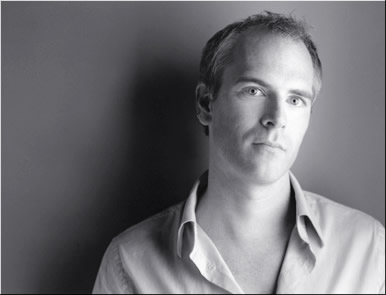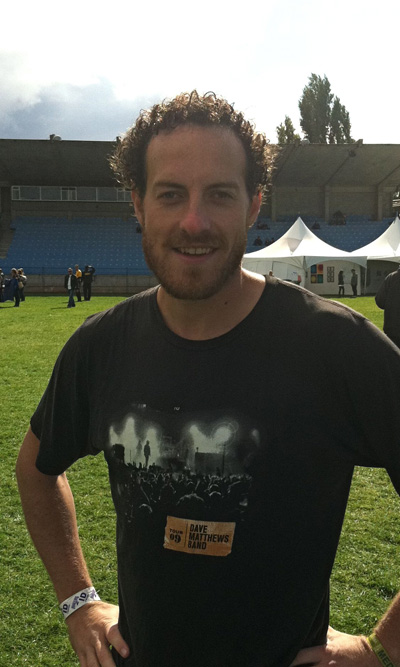Interviews
Such is Drama:
Tyler Laing in Conversation with
Michael MacLennan
 Malahat fiction board intern, Tyler Laing, interviews our UVic 50th Anniversary Prize judge in the dramatic monologue category, Michael MacLennan, about his writing, what he's looking for in a winning entry, and his views on writing contests.
Malahat fiction board intern, Tyler Laing, interviews our UVic 50th Anniversary Prize judge in the dramatic monologue category, Michael MacLennan, about his writing, what he's looking for in a winning entry, and his views on writing contests.You’ve had quite the career writing and producing for both the stage and screen. How much credit do you give your time at UVic for getting to this point? What was a highlight or two from your time as a student?
Three ways come to mind. First and probably foremost, was the one and only creative writing class I took - a year-long poetry course, led by Patricia Young. Stage writing, as we know, had its roots in poetry, and its aural elements, and the need to be concise ... dramatic writing shares these virtues with poetry. I find myself constantly drawing on the lessons I leanred in that class, from something overtly "poetic" like an opera libretto, to a scene of television, which I have to somehow render down to five exchanges of dialogue.
I also gained a great deal by my studies, getting my degree in Honours English. I gained skills that enabled me to deeply read the best work of every genre, I garnered the critical acumen to then have a meaningful response to that work . . . and I learned how to communicate those ideas through writing. In some sense that’s still what I’m doing every day. Professors Patrick Grant and Anthony Jenkins basically changed my life — the first taught me how to read and the second, how to write.
And finally, there was something about studying in Victoria — the size of both campus and city were the right fit for me. I was suitably challenged and saw my horizons broadened, but it wasn’t so overwhelming that I could feel there was “room” for whatever I might bring to the picture. I’ve often said that had I gone to university in, say, Toronto, I believe I’d have not had the gumption to start writing.
At what point in your life did you realize you wanted to pursue a career in writing and producing?
I put myself through university through the UVic Co-op program, which enabled me to work in various Victoria arts organizations: Kaleidoscope Theatre, Victoria Arts Collaborative, and the Victoria Fringe. In the process I got all kinds of first-hand experience in theatre and the arts. But it wasn’t until I quit my job as interim director of Open Space Arts Society that I had gathered the courage to write, direct, and produce my first play. My friends thought I was crazy. I told myself that if it was a disaster (and I’d seen plenty of train-wrecks over the years) I’d quit and go back to arts administration. Luckily (and that would hardly be advice I’d give any fledgling writer) the first play, Beat the Sunset, did very well. From there, it was just broadening horizons and having the guts to say “yes” to opportunities as they came.
What do you enjoy about the creation or the performance of dramatic dialogue? What are the challenges of writing in this genre?
Many of my plays make use of monologue — notably Beat the Sunset, Grace, Life After God, and most recently, The Good Egg. It can be a powerful dramatic choice and if handled badly, a dead zone. I try and ensure that there’s sufficient drive behind a character — a kind of “fuel” of context and emotion that can see a person through saying what they need to. And like all good dramatic writing, it needs to be peppered with the right unexpected elements, both in the content of what is being said, and the change the character experiences in the saying of it.
What do you look for in a well-crafted monologue? What are you hoping to find within the entries you judge?
For me, a well-crafted monologue has four things: A specificity of voice, a sense of economy, some kind of engagement with its audience (whatever the conceit), and a dramatic “turn” of some kind that befalls the speaker. For me, it’s not enough to just have a character describe something happening, however powerful. I’m looking for how that shift occurs, on some level, before our eyes.
If I could render it down to one thing, I’d say that it be fun — for the actor, for the audience. This isn’t to say it needs to be comic or silly, but that there is a drive, a bravado, a freshness that one can see inspiring an actor and gripping an audience. I guess by this definition, one can be both harrowing and fun — such is drama!
When you were first starting out in your career, both during university and after, how much did you try and enter contests? What were some of the initial festivals you targeted? What other ways did you perhaps try and get your name/work out there?
I entered a lot of contests off the top. My first play, Beat the Sunset, won the Theatrum National Playwriting Award, and I’ll never forget the thrill of Sharon Pollock — Sharon Pollock!! — calling me personally with the news that I’d won. In addition to the financial boosts they provided, the support to my morale was tremendous. Same goes for the
Theatre BC National Playwriting Competition and the Herman Voadan Prize, both of
which I won twice.
To new playwrights, I’d say: become a member of the Playwrights Guild of Canada, and enter every contest and call for submissions they put across the transom. They don’t let anything pass by.
People say all the time that writers must read in order to develop. How should playwrights and screenwriters go about honing their skill or style? Is it more about watching, listening, or reading; or acting, perhaps?
Obviously, one needs to watch theatre and/or films, and often. But I’m also a believer in reading scripts. They’re how we can really unpack the work of a writer, to understand the various bold ways stories can be told, and to basically add a greater array of tools to one’s toolbox. But when all is said and done, there’s no substitution for simply showing up at the page and writing, rewriting, and continuing to hone one’s craft. If you don’t want to do this, or don’t feel it’s necessary… let’s be honest, you’re no writer. You know one thing I’ve read for ten years? The Malahat Review. From my first year at UVic onwards, I had a subscription — and years later, even wrote reviews for a while. The Malahat is the best-edited, (“curated”?) literary journal in the country, and I wanted to read the best of what was being written around me. I should add that I submitted a number of poems way back when, but I never got published — high standards!
What are the current “jobs” that take up your time these days? Have you got any new projects on the horizon?
I’m currently executive producer, co-showrunner and head writer on Global TV’s Bomb Girls. The second season premieres in January, 2013. It’s taken up most of my energy, but I’m also writing an adaptation of the Peter Gadol novel Light at Dusk, it’s entitled “Envoy.” I’m doing a feature adaptation of Douglas Coupland’s novel Hey Nostradamus!
I’m doing an original feature set in Nova Scotia in the ̕40s, and completing the libretto for an opera with composer Jeffrey Ryan, based on the Book of Ruth. And yeah, continuing to develop a number of new series ideas, with a new notion for a play that’ll probably take a while to get to. So I’m a busy boy.Many students, both past and present, are hoping to win The Malahat Review’s UVic 50th Anniversary Writing Contest. What’s another goal or two that you might have?
I remember being in UVic’s Phoenix Theatre, in Juliana Saxton’s class, where she led us through an exercise that helped us articulate our creative goals — what we hoped to achieve in a career. She helped me get clear: for me success was being able to make a good living from my work and have the high regard of my colleagues. At the time it felt like a pipe-dream and yet here I am, these twenty-five (!) years later, having achieved those goals. I feel very fortunate. Moving forward, I’d say I hope to continue to work with high-quality material, and to balance any further career success with a good life. Back then, I'd vowed to make my career top priority, and I’ve done all right. Now it’s time for some balance. After all, you can’t write about life without living a little.

Tyler Laing
* * * * * * * *
Check out the guidelines for our University of Victoria 50th Anniversary Prize.









